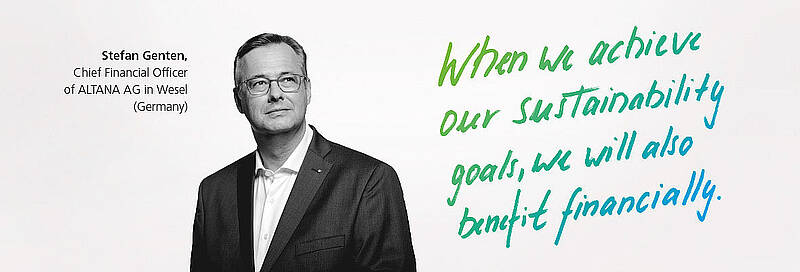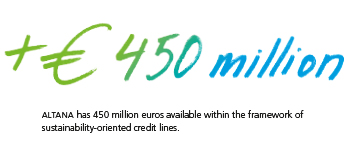Which paths lead to more sustainability? Certainly more than one. But probably few people think of Group Financing. As ALTANA’s Chief Financial Officer, Stefan Genten is not only responsible for key financial indicators, but also uses sustainability factors as a management tool.
The experienced businessman feels responsible not only for creating wealth, but also for using it for social and ecological sustainability, so that the overall system of society, ecology and economy will function across generations.
“In terms of sustainability, we want to be significantly above the industry average and thus send a clear signal both internally and externally,” explains Stefan Genten. “This applies to our own processes and goals, such as achieving climate neutrality by 2025, as well as to products and solutions that enable our customers to act more sustainably themselves.”
Non-financial key figures in the Corporate Report
In 2020, ALTANA for the first time integrated so-called non-financial key performance indicators (KPIs) into its Corporate Report, on an equal footing with traditional financial key performance indicators. The KPIs include key figures on occupational safety and the company’s CO2 balance. The latter two values are not only published, but also certified by the independent auditor as part of the audit of the Group Management Report in the same way as the financial KPIs listed there. “This closes the circle,” says Genten: “We formulate ambitious targets, implement them, have them audited, and publish the results. We subject the financial and non-financial indicators to the same standards. After all, we can only be economically successful in the long term if we take ecological and social aspects into account in our decisions and systematically anchor them in our company.”
Financing through sustainability-linked credit lines
A further expression of ALTANA’s integrated understanding of sustainability is the new strategic Group financing set up in 2021. As a healthy, growing company, ALTANA now has two attractive instruments at its disposal: a credit line of up to EUR 250 million with an ESG link from an international banking consortium and, for the first time,
a loan commitment of EUR 200 million from the European Investment Bank (EIB) to support green research projects in line with the European Green Deal. The interest rate or loan amount depends among other things on the company’s sustainability performance. “In concrete terms, this means that if we achieve our sustainability goals, we also benefit financially,” sums up Stefan Genten. The loans are thus both proof of the company’s past performance in this area and an additional driver of future product and solution development. ALTANA has a total of 450 million euros at its disposal thanks to the newly established Group financing.

Stefan Genten takes an integrated view of sustainability and applies the same standards to both financial and non-financial indicators, such as CO2 savings and occupational safety. | Sustainability goals also play a key role at ALTANA in the orientation of its growth and innovation strategy, in decisions on investments and acquisitions, in collaborations with suppliers, and very practically in target agreements and training.
Integrated approach to corporate management
For ALTANA, sustainability is not a criterion to be considered separately. “We pursue an integrated approach,” says Genten. “Clearly and measurably formulated sustainability goals, practicable key figures, and transparent reporting ensure that our sustainability requirements are effectively anchored in both strategic and operational corporate management.” In his professional life, Stefan Genten lives out his ideal in his private life: “I basically think holistically. As part of society, I have a special responsibility in my position to ensure that, on the one hand, wealth is created and, on the other, that this wealth is used for social and ecological sustainability, so that the overall system of society, ecology, and economy will function across generations. I couldn’t imagine working for a company where sustainability didn’t have this high priority.”

